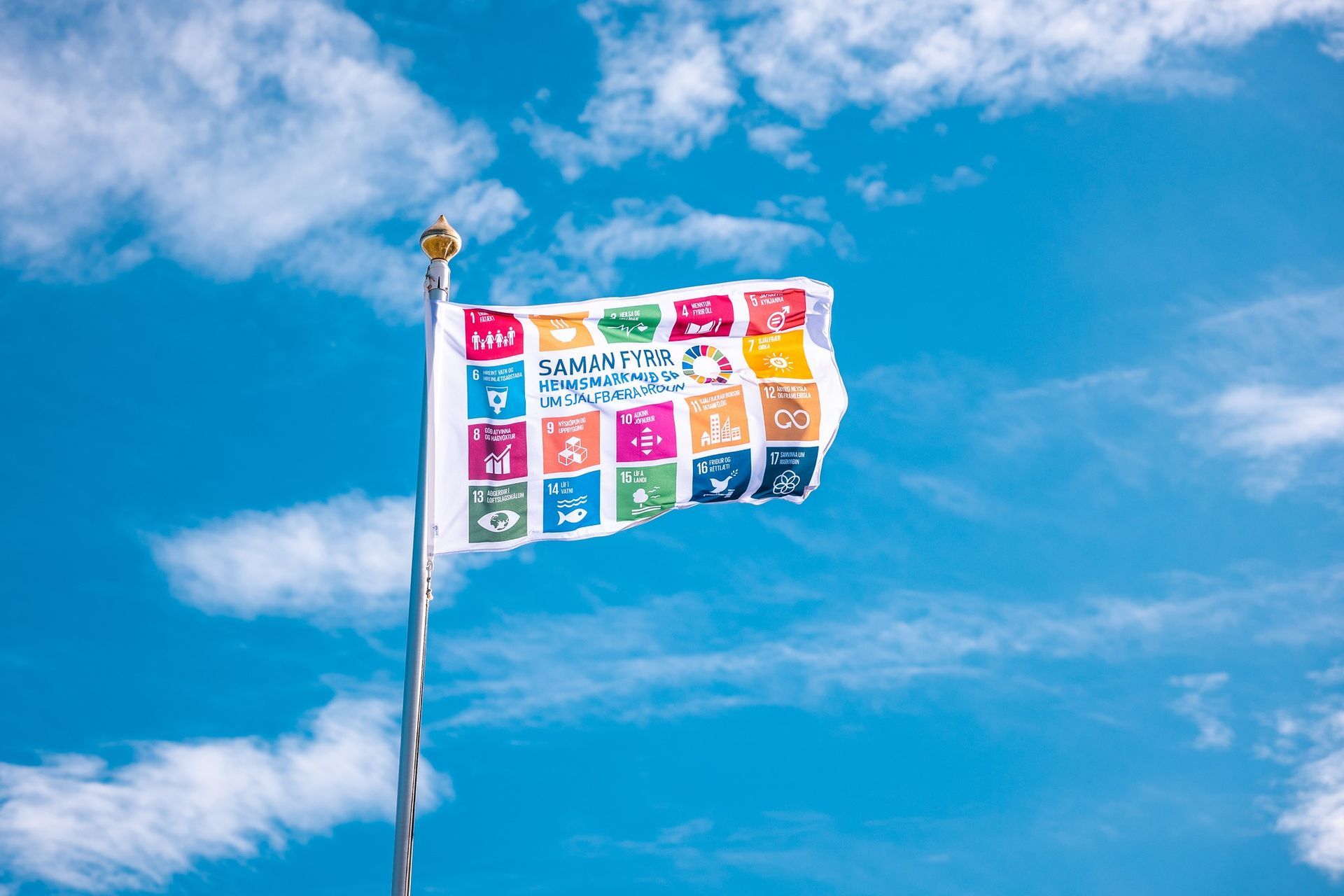Dilemmas in Science-based Climate Action
Audur Gudmundsdóttir • 2. apríl 2024
Vefnámskeiðaröð
um áskoranir fyrirtækja þegar kemur að vísindalegum loftslagsaðgerðum (e. Dilemmas in science-based climate action).
Á námskeiðunum verða skoðuð helstu áskoranir, vandamál og lausnir sem leiðandi norræn fyrirtæki standa frammi fyrir þegar þau vinna að því að ná vísindalegum loftslagsmarkmiðum sínum.
Vefnámskeiðaröðin er samstarfsverkefni UN Global Compact á Norðurlöndunum og opin öllum áhugasömum til þátttöku að kostnaðarlausu.
Vefnámskeið 1: Product Durability and Lifetime Emissions Dilemma
Dagsetning og tími:
9. apríl kl. 8:00-9:00 (GMT)
As part of the European Green Deal, the EU Commission is inciting companies within the Union to produce more durable and longer-lasting products with a focus on circularity. While this is a positive development, it highlights an inherent dilemma within companies producing energy-consuming products which have set ambitious climate targets.
Companies which work to increase the durability of their energy-consuming products will likely see an increase in scope 3 emissions due to increased use-phase emissions (GHG Protocol, category 11), making it more difficult to reach ambitious climate targets and demonstrate climate action.
In this webinar, we will outline this dilemma and how it manifests itself as concrete challenges for companies. We will also dive into possible solutions such as the potential for industry standards, novel business models, circular design, and climate action demonstrated outside of the GHG Protocol (such as avoided emissions). We will also present direct inputs to the revision of the GHG Protocol.
Speakers:
- Fanney Frisbæk, Head of Department, Strategic Sustainability Consulting Norway, Rambøll Management Consulting
- Janus Kirkeby, Head of Department, Waste & Resource Management, Rambøll
- Sophie Sfez, Senior Sustainability Specialist, Nilfisk
Vefnámskeið 2: Supplier Engagement to Cut Emissions and Increase Adoption of Greener Materials
Dagsetning og tími:
10. apríl kl. 8:00-9:30 (GMT)
Companies that provide physical products typically exist within a long and complex value chain, with a large portion of their GHG emissions originating from their supply chain. Yet managing supply chain emissions presents an ominous challenge which calls for deliberate supplier engagement efforts. But how can suppliers be effectively engaged to reduce these emissions?
In this webinar we will cover how supplier engagement can be applied to cut overall GHG emissions, as well as to increase the adoption of greener materials. Leading companies with complex supply chains will also share how they work with supplier engagement to reduce GHG emissions and implement greener materials into their products. We will also introduce the brief Supplier Engagement to Cut Emissions and Increase Adoption of Greener Materials, which covers related key challenges and suggested solutions.
Speakers:
- Fanney Frisbæk, Head of Department, Strategic Sustainability Consulting Norway, Rambøll Management Consulting
Vefnámskeið 3: Setting Forest, Land and Agriculture (FLAG) targets
Dagsetning og tími: 11. apríl kl. 8:00-9:00 (GMT)
The forest, land and agriculture (FLAG) sectors play a crucial role in addressing climate change. Many companies will soon be expected to set targets for their emissions associated with FLAG activities. However, target setting and carbon accounting methods for FLAG sectors are still in the early stages of development, and tracking emissions in FLAG sectors is complex.
In this webinar, we aim to navigate these complexities and uncertainties, providing an introduction to the challenges around setting FLAG targets and some recommendations for those companies just starting on the journey. As we step through the main sections of the Introductory Briefing, we will:
Introduce key aspects of the Science Based Targets initiative’s FLAG target-setting framework, including relevance, eligibility, and methods.
Discuss key challenges and provide recommendations on the following: Carbon accounting, target setting, data collection and emissions factors, value chain engagement
Speakers:
- Shane Hughes, Director of Corporate Net Zero Services, Rambøll Management Consulting
- Lars Lundahl, Environmental Manager, Orkla

Í ár fögnum við 25 ára afmæli UN Global Compact, stærsta sjálfbærniverkefnis heims á vegum Sameinuðu þjóðanna og stofnun félagsins á Íslandi. Viðburðurinn markar bæði tímamót og tækifæri þar sem hann hann endurspeglar árangur síðustu ára og kveikir nýjar hugmyndir um framtíð íslensks atvinnulífs í takt við heimsmarkmið

SKRÁ ÞÁTTTÖKU Í FÁNADEGI HEIMSMARKMIÐANNA 2025 Árið 2025 stöndum við á krossgötum þar sem aðeins fimm ár eru eftir til að vinna að Heimsmarkmiðum Sameinuðu þjóðanna. Staðan í heiminum er krefjandi með yfirvofandi loftslagsvanda, ójöfnuði og átakalínum milli þjóða sem draga úr framförum. Þrátt fyrir það sýna nýjustu skýrslur að árangur hefur náðst þegar við stöndum saman. Samkvæmt nýjustu framvinduskýrslu Sameinuðu þjóðanna eru aðeins um 35% markmiða á réttri leið. Þó hefur á þessum tíma tekist að ná verulegum framförum í mikilvægum málaflokkum þar sem tíðni ungbarnadauða hefur lækkað, fleiri börn hafa aðgang að skóla og yfir 90% jarðarbúa hafa nú rafmagn ( UN SDG Report 2025 ). Flöggum 25. september 2025 Fánadagur Heimsmarkmiðanna er tækifæri til að minna okkur á að hvert einasta framtak skiptir máli. Með því að flagga fánanum sýnum við vilja til að vera hluti af lausninni, hvort sem við erum fyrirtæki, skóli eða stofnun. Með því að flagga fána Heimsmarkmiða Sameinuðu þjóðanna erum við að sýna samstöðu, vekja umræðu og hvetja til nýrra hugmynda sem styrkja vegferðina að betri heimi fyrir öll. Hverjir geta tekið þátt? Fyrirtæki, stofnanir, skólar, samtök og sveitarfélög sem eru þátttakendur í UN Global Compact og/eða hafa hafið innleiðingu á heimsmarkmiðum í rekstur sinn geta tekið þátt í framtakinu. Vinsamlega skráðu þátttöku hér. Athugið einnig er hægt að taka þátt rafrænt (á samfélagsmiðlum). Leiðbeiningar fyrir þátttöku Þegar þátttaka hefur verið skráð fær tengiliður sendar leiðbeiningar fyrir fánadaginn, merkingar fyrir samfélagsmiðla og tillögur að færslum fyrir heimasíður/samfélagsmiðla sem hægt er að útfæra með eigin sniði. Þar sem fánadagurinn er samstillt framtak, þá biðjum við ykkur um að fylgja sérstaklega leiðarvísinum þegar kemur að merkingum fyrir samfélagsmiðla. Endilega takið myndir og myndbönd af fánanum með starfsfólki/forstjóra og deilið á ykkar miðlum. Panta fána Til að lágmarka kolefnisfótspor eru fánarnir prentaðir á Íslandi. Fáninn kostar 22.500 kr. stk. og er sendingarkostnaður innifalinn í verðinu. Stærð fána er 150x100cm og passar á 6m fánastöng með krækju að ofan og neðan. Texti er á íslensku. SKRÁ ÞÁTTTÖKU OG PANTA FÁNA Deildu þátttökunni Þann 25. september n.k. eru þátttakendur hvattir til að deila þátttöku sinni í fánadeginum á eigin miðlum. Leiðbeiningar (e. toolkit) með tillögum að texta, #merkingum, myndefni o.fl. verða sendar þegar þátttaka hefur verið staðfest. Um framtakið United Nations Global Compact hefur frá árinu 2019 staðið fyrir fánadegi Heimsmarkmiðanna. Vinsældir þessa framtaks hafa farið ört vaxandi um allan heim og sífellt fleiri flagga fána fánanum árlega. UN Global Compact á Íslandi og Félag Sameinuðu þjóðanna á Íslandi standa nú í þriðja sinn, saman að deginum hér á landi. Fánadagur Heimsmarkmiðanna er frábært tækifæri til að vekja athygli og skapa umræðu um það sem þátttakendur eru að gera til að vinna markvisst að markmiðunum. Eru sjálfbærnifrumkvöðlar í fyrirtækinu? Fánadagurinn veitir tækifæri til að miðla sögum og viðburðum á heimasíðu eða samfélagsmiðlum. Hvetja má starfsfólk til að vinna í einkalífi jafnt sem í starfi að heimsmarkmiðunum. Fræðslan Good Life Goals er einn vettvangur til að hefja þessa vegferð. Kynna má fyrir hagaðilum, þ.m.t. fyrirtækjum í virðiskeðju, viðskiptavinum, neytendum og nærsamfélaginu, aðgerðir í tengslum við heimsmarkmiðin sem þátttakandi vinnur út frá. Hvatning til frumkvöðla og ungu kynslóðarinnar um að móta nýjar leiðir til að ná fram heimsmarkmiðunum.

SKRÁNING Athugið: Þetta námskeið er haldið af staðarneti UN Global Compact í Sviss og Lichtenstein og fer fram á ensku. Námskeiðið er opið öllum áhugasömum. Lítil og meðalstór fyrirtæki (SME) gegna lykilhlutverki í sjálfbærri þróun á Íslandi og um heim allan. Hins vegar standa mörg SME frammi fyrir sérstökum áskorunum þegar kemur að því að sjálfbærniviðmið skili sér í aðgerðum. Þessi vefnámskeiðsröð býður upp á hagnýt ráð sem auðvelt er að aðlaga að ólíkum rekstri til að styðja SME við að innleiða sjálfbærni og tíu meginmarkmið UN Global Compact í daglega starfsemi fyrirtækja. Sjálfbærni er vegferð, ekki einföld aðgerð sem framkvæmd einu sinni. Þetta námskeið byggir á fjögurra þrepa ferli sem hjálpar SME að kortleggja forgangsröðun, móta stefnu, framkvæma markvissar aðgerðir og skila árangri á skilvirkan hátt. Námskeiðið er fjögur skipti - 30 mínútur í senn. 4. september 2025 kl. 9:30 - 10:00 (GMT) - Mapping Sustainability Priorities 11. september 2025 kl. 9:30 - 10:00 (GMT) - Defining Your Sustainability Strategy 18. september 2025 kl. 9:30 - 10:00 (GMT) - Integrating Action and Interventions 25. september 2025 kl. 9:30 - 10:00 (GMT) - CoP Reporting and Communication Af hverju að taka þátt: Hnitmiðað og skilvirkt – aðeins 30 mínútur hver fundur. Skref-fyrir-skref leiðsögn með skýrum ferlum/áætlun. Sérstaklega sniðið að áskorunum og tækifærum lítilla og meðalstórra fyrirtækja. Hagnýt verkfæri sem hægt er að nota strax. Tækifæri til að læra af öðrum fyrirtækjum og raunverulegum dæmum. Fyrir hverja: Námskeiðið er opið fyrir alla og er ekki skilyrði að vera þátttakandi í UN Global Compact. Námskeiðið er sérstaklega hugsað fyrir stjórnendur lítilla og meðalstórra fyrirtækja og/eða þeim sem bera ábyrgð á að móta eða framkvæma sjálfbærnistefnu. Hvort sem þú ert að taka fyrstu skrefin eða vilt skerpa á núverandi aðferðum, munu þessi námskeið veita þér hagnýta þekkingu til að skapa raunveruleg áhrif. Tungumál: Enska

Í haust hefst fundaröðin Halló! þar sem sjálfbærni fyrirtækja verður rædd út frá fjölbreyttum sjónarhornum. Halló! Áhætta - í september Halló! Sjálfbær framtíð – tækifæri og áhrif í atvinnulífinu - í september/október Halló! Hvaða bakslag - í október / samstarfsverkefni með UN Women Íslandi Fundirnir fara fram víðsvegar um landið og verða auglýstir jafnóðum.

SBTi Starter pack er yfirgripsmikið netnámskeið sem ætlað er að veita norrænum fyrirtækjum þá þekkingu og verkfæri sem þau þurfa til að skuldbinda sig við Science Based Targets initiative (SBTi). Ef fyrirtækið þitt er tilbúið að setja sér metnaðarfull markmið um losun sem samræmast alþjóðlegum viðmiðum, mun þetta námskeið leiðbeina þér í gegnum hvert einasta skref. Þátttakendur öðlast djúpan skilning á SBTi rammanum – frá undirbúningi og markmiðasetningu til langtíma eftirfylgni. Með því að taka þátt í þremur vefnámskeiðum undir leiðsögn sérfræðinga, auk umræðuvettvangs á netinu og aðgengi að mikilvægum gögnum og verkfærum. Nánar um námskeið og skráning

Námskeið hefst 29. ágúst 2025 SKRÁNING Í ljósi vaxandi andstöðu við aðgerðir gegn mismunun á heimsvísu er nú mikilvægara en nokkru sinni fyrr að fyrirtæki átti sig á því hvernig inngildandi stefna getur dregið úr áhættu og skapað virði – bæði fyrir fyrirtækið og samfélagið. Norræn fyrirtæki, sem starfa í sterkum velferðarkerfum og skora hátt í jafnréttismælingum, eru í góðri stöðu til að sýna fordæmi og leiða veginn í eflingu mannréttinda, jafnræðis og inngildingar í gegnum alla starfsemi og virðiskeðjur. Norræna prógrammið um aðgerðir gegn mismunun er netnámskeið sem er ætlað til að styðja norræn fyrirtæki í að efla jafnræði og inngildingu (e. inclusion) í allri starfsemi sinni. Ef fyrirtækið þitt er tilbúið að stíga markviss skref til að greina, meta og bregðast við áhættu sem tengist mismunun, mun þetta námskeið leiða ykkur áfram með hagnýt verkfæri og innsýn sérfræðinga. Af hverju núna? Vernd gegn mismunun er grundvallarmannréttindi. Að skapa inngildandi og réttlátt starfsumhverfi er ekki aðeins siðferðislega rétt, heldur einnig skynsamleg viðskiptaleg ákvörðun. Aðgerðir gegn mismunun stuðla að jákvæðri vinnustaðamenningu, örva sköpunargleði og nýsköpun, laða að og halda í hæfileikaríkt starfsfólk, auka þátttöku og skuldbindingu starfsfólks og bæta orðspor fyrirtækja. Fyrirkomulag Í gegnum fimm fræðslufundi undir leiðsögn sérfræðinga, jafningjanám og sjálfstæða vinnu öðlast þátttakendur traustan skilning á því hvernig meta má áhrif starfseminnar, forgangsraða aðgerðum og samþætta aðgerðir gegn mismunun á vinnustað, í aðfangakeðjum og samfélaginu. I. Föstudagur 29. ágúst kl. 8:30-10:30 (GMT) Kynning á dagskránni og verkefnum, tækifæri fyrir þátttakendur til að kynnast hver öðrum. II. Föstudagur 19. september kl. 8:30-10:30 (GMT) Hvað er mismunun? Skilgreiningar og mismunandi nálganir í stjórnun. III. Föstudagur 24. október kl. 8:30-10:30 (GMT) Ítarleg umræða um ákveðna hópa og áskoranir sem þeir standa frammi fyrir. VI. Föstudagur 21. nóvember kl. 7:30-9:30 (GMT) Neikvæð áhrif markmiða og bakslag. Föstudagur 12. desember kl. 7:30-9:30 (GMT) Lærdómur og aðgerðir Námskeiðið fer fram á ensku, er kennt á netinu og er eingöngu fyrir þátttakendur í Global Compact. Fyrir hverja Fulltrúar fyrirtækja sem starfa að félagslegri sjálfbærni, mannréttindum, fjölbreytileika, jafnrétti og inngildingu (DEI), mannauðsmálum eða skyldum sviðum eru hvattir til að skrá sig. Námskeiðið er samstarfsverkefni UN Global Compact í Danmörku, Finnlandi, Íslands og Svíþjóðar. Hvert fyrirtæki getur skráð tvo þátttakendur.

Hvenær: 22. maí 2025 kl. 8:45-10:30 Hvar: Hús atvinnulífsins, Borgartúni 35 SKRÁNING - Fundurinn er opinn öllum áhugasömum! Töluverðar breytingar hafa orðið á kröfum um upplýsingagjöf um sjálfbærni á síðustu mánuðum og mörg fyrirtæki standa frammi fyrir því að þurfa aðlaga vinnu sína að því. UN Global Compact á Íslandi og Nordic Sustainability, ráðgjafafyrirtæki sem sérhæfir sig í stefnumótun og sjálfbærni, bjóða þér til opins fundar þar sem farið verður yfir sjálfbærnimál í kjölfar Omnibus tillögu ESB út frá sjónarmiðum fyrirtækja á Íslandi og í Evrópu. Dagskrá: Kl. 8:45 - Húsið opnar með kaffi og kruðerí Kl. 9.00 – Opnun fundarins - Auður Hrefna Guðmundsdóttir, framkvæmdastjóri UN Global Compact á Íslandi Kl. 9.05 - Ein stoð dugar skammt – Mikilvægi þriggja stoða sjálfbærni fyrir framtíðaráskoranir - Elva Rakel Jónsdóttir, framkvæmdastjóri Festu Kl. 9:10 - ESRS vegferð Festi, þarf allt að vera tilbúið strax? - Stefán Kári Sveinbjörnsson, sjálfbærnistjóri Festi Kl. 9.30 - Hvernig getum við nýtt niðurstöður ESRS vinnu á stefnumótandi hátt? (erindi á ensku) - Anniina Kristinsson, meðeigandi hjá Nordic Sustainability Kl. 9.50 - Pallborðsumræður um áhrif Omnibus á íslensk fyrirtæki og hvað tekur við Aðalheiður Snæbjarnardóttir, forstöðumaður sjálfbærni hjá Landsbankanum Dagný Engilbertsdóttir, forstöðumaður stefnumótunar hjá Festi Jóhanna Hlín Auðunsdóttir, forstöðumaður loftslags- og áhrifastýringar hjá Landsvirkjun Kl. 10.20 - Lokaorð



